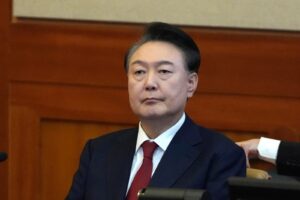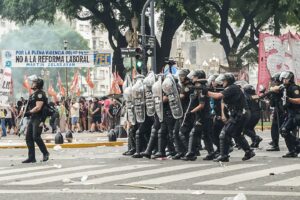
Published 09/02/2023 18:53 | Edited 02/11/2023 11:19
The real motivations of a war are lost over time. There comes a time when no one knows why something so destructive can be justified. Russia’s own motivations against Ukraine changed, starting from a demand against an agreement on the installation of NATO bases (the western army that surrounds Russia since the communist period), to the possibility of annexing territories to the east.

During an interview with Red Portal, the specialist in International Relations, Flávia Loss Araújo (FESPSP), observes how the narrative of the war changed in just one year, reaching the current level. 2023 began with the US and European countries willing to send heavy weapons to a Ukrainian offensive against Russia. With that, according to her, the negotiations for peace disappeared from the horizon.
Flávia notes how the press and military intelligence at the Pentagon are cautious in using words that were commonplace at other times. “We are not talking about victory or defeat, but about bleeding, causing great damage to Russia,” he observes. The ease with which the proximity of Russian defeat was trumpeted in the Western press is now something less visible.
The war that started with a speech in defense of Ukraine, evolved to inflict defeats on Russia, but without spiking the possibility of bringing Vladimir Putin to his knees. “There is no talk of total victory, as Russia has demonstrated its military (and nuclear) potential”, she ponders.
In any case, everything points to a very strong counter-attack from the West, in these first months of the year, with imponderable results. “The narrative of the war is unpredictable, as it depends on the reprisal that will come from Russia. The eventual change in discourse, from bleeding Russia to destroying it, or making concessions towards peace, will depend on the response of this nuclear power”, says the professor.
Brazilian foreign policy

Since the election campaign, presidential candidate Luis Inácio Lula da Silva has already spoken of an effort by Brazil to mediate peace and stop this escalation of destruction that affects the whole world. As soon as he took office, he vetoed the proposal to send tanks to Ukraine. On his trip to the US, he already anticipated that he will propose a Peace Club to Joe Biden, as he has already proposed to the German government.
Professor Flávia considers the position of the Brazilian government to veto the shipment of armaments and signal an effort for peace to be right. “Developing countries in the Global South have condemned the Russian invasion but have not adhered to sanctions and disagree with Russia’s isolation. This opens up an opportunity for dialogue,” she says.
She recalls that Brazil is part of the BRICS (Brazil, Russia, India, China and South Africa), therefore it must also be at the negotiating table. “Brazil is an important voice, even more so in a scenario that has very few voices asking for negotiations. It’s someone else asking for tempers to subside and calling for minimal dialogue.”
She envisions this initiative as pressure from various developing countries, in a continuous and prolonged effort. “This is a position in line with traditional Brazilian foreign policy. Brazil is a peaceful country, which respects the autonomy of other countries, values it, respects the UN Charter, and has a good dialogue with both Russia and Ukraine”, she mentioned.
This, therefore, would be a movement that neither comes from the European Union, nor from the USA, at this moment. “We cannot be naive that this would solve it, but this possibility has to be on the table, all the time. Or we’re left with this conflict going on indefinitely. Not to mention living with a nuclear threat,” he warned.
When commenting that Lula declared that his “war is against hunger”, Flávia noted that one of the few successful negotiating tables in this entire period took place at the initiative of Turkey, for an agreement on the flow of grains. The food insecurity that affected the countries dependent on Ukrainian wheat was only overcome because of this successful negotiation to dispose of grains, through the Black Sea, and guarantee the supply in countries dependent on Ukrainian wheat. With that, she says, a catastrophe of hunger and food insecurity in African and Asian countries was avoided.
“If the US and the EU are not discussing or concerned about food insecurity in the world, let the developing countries have their voice heard”, he defended.

ongoing narrative
February 24 is considered the starting date of Russia’s invasion of Ukraine. A year later, only now, is the sending of heavy weapons for the “defense” of Ukraine. Something that Russia considers a dubious involvement of other NATO countries in the bilateral conflict.
At the beginning of the war, the West (USA and European Union) decided to only send ammunition and lighter weapons so as not to have a direct involvement in the war and suffer attacks from Russia.
“The idea was to send all the necessary weapons and money under a speech, previously, in defense of Ukraine. Over time, as Russia retreated to the east, in Donetsk and Luhansky, the discourse changed, and the perception, including from the Pentagon (US intelligence) and the UEE, is that this is the moment to enter with heavier weapons”, explains Flavia.
She mentions Germany’s resistance to participating in this. “She doesn’t want to be the European leader in sending these Leopard tanks and makes the shipment conditional on US participation, too. The logistics for sending these tanks is immense, demanding special training for the troops, because they are very advanced. With that, in a few months, Ukraine’s counterattack may indeed lead to a shift in the balance of this war in Ukraine’s favor. But it’s too early to talk about victory, because Russia is also preparing to respond and it’s not known what could happen”.

According to her, the bet that the West is making is that it is possible to cause great damage to the Russian army. “The Pentagon has been cautious in terms of being able to inflict defeats, the idea is to keep bleeding and weakening, but they don’t believe in a total victory, because the Russians are a military and nuclear power. They have the ability to send long-range missiles, with bombing to any point in the territory of Ukraine and even Europe, and there is nuclear capacity, which has already been used as a threat. That risk is real. Hence the caution”.
The expert does not believe that the war will spread to other countries. Contrary to what sometimes appears in the media, “that the Russians are lost and weakened”, she assesses that they have a strategy and “know what they are doing”. “They retreated to Donbass, on the border with Russia, but to recover, they set up a new strategy”.
It is important to note, in her opinion, that Russian territory has not yet been reached. “There were almost 100,000 deaths of soldiers, which is something unimaginable, which affects Russian public opinion, but there has still been no destruction inside Russian territory”, she says, about the support maintained by Putin among the people and local elites.
For all intents and purposes, Flávia considers it important to maintain a critical sense in relation to the news and war propaganda on both sides. “For us, here in the West, much more information comes from Europe and the US than from Russia. It’s a duel of narratives,” he said.
“But the truth is usually in the middle.” She recalls that, at the beginning of the war, Russia had, in fact, several logistical problems with old weapons, from the Soviet period, a certain disorganization of the troops and even communication problems with the generals.
“But this speech greatly underestimated the military power that is Russia. We always have to remember the ability to launch long-range missiles and the last card, which is the nuclear threat. So much so that the US media itself has changed its tone and no longer talks so much about victory, but about bleeding and diminishing the capabilities of the Russian army, ”he summed up.
hopeless horizon
Efforts for dialogue were negligible, according to the researcher’s opinion. “The two belligerent countries did not want to talk. When they sat down to talk, it was under pressure from their allies. With that, the demands are irreducible, on both sides”, she says.
Flávia mentions the constraints that completely block the dialogue. “Ukraine is the country that suffered aggression, it does not accept being conquered, dominated and annexed. Russia, on the other hand, has very strong motives when it comes to national security. That’s the point, as much as many don’t accept it. It is understandable that Russia does not want NATO troops on the border of its territory. It does not justify the aggression, but we understand the fear because of the security of its borders”.
In November, the US pressed Zelensky to tone down and revert to using the word negotiation. There is a tiredness in Europe with the prices of energy, fuel, rising inflation and everything. Thus, the Ukrainian leader starts talking about negotiation, but puts impossible conditions to sit on the table under the intermediation of the UN. He asks for Russia’s total withdrawal from its territory, that it pay war reparations for all the damage to infrastructure, for the deaths it caused, about one hundred thousand, in addition to the seven million refugees throughout Europe. And also that she submit to an international tribunal to be tried for her war crimes.
“Russia’s response was its equally impossible conditions. In November, Russia wanted Ukraine to recognize its sovereignty over the territories under its domination. Obviously, no one sat down at the negotiation table and nothing was advanced”, concludes the teacher. The consequence said is that Dimitri Peskov, spokesman for the Kremlin, the Russian government, said he does not see diplomatic conditions for a solution to the conflict.
“What you see now are just news of more attacks and counter-attacks, shipments of weapons. The possibility of negotiation disappeared from the field of vision of both sides”.
Source: vermelho.org.br

